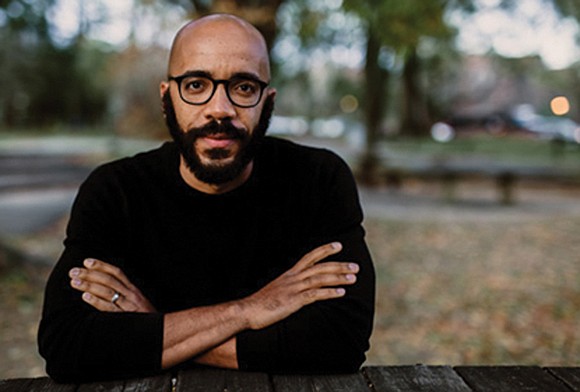Best-selling author Clint Smith is keynote speaker at VMFA symposium
Bonnie Newman Davis | 1/25/2024, 6 p.m.
Author, journalist, poet and scholar Clint Smith says he has been overwhelmed by the enthusiastic and positive response to his best-selling book “How the Word is Passed: A Reckoning with the History of Slavery Across America.”
The 2021 book, “which explores the legacy of slavery in America—and how both history and memory continue to shape our everyday lives,” writes Drew Faust of Harvard magazine, won the National Book Critics Circle Award for Nonfiction and was named one of the New York Times 10 Best Books of 2021.
Dr. Smith will be the keynote speaker on Friday night during a two-day symposium, “Picturing the Black Racial Imaginary,” at the Virginia Museum of Fine Arts (VMFA).
Speaking by telephone earlier this week, Dr. Smith, 35, says his reaction stems not from any fears that his book wouldn’t be recognized or hailed by critics. Rather, it never occurred to him while sitting alone for years with his thoughts and conversations whirling in his head would result in his words being taught in high school classrooms, read by dozens of book club members and heard in lecture halls throughout the country.
“I feel so incredibly lucky,” he said. “There are so many writers who write” and never see their work” met with such strong response. “I am filled with gratitude.”
The deep-voiced New Orleans native explained that he wrote “How the Word is Passed” as a 15-year-old version of himself. Growing up in what was the seat of the Atlantic Slave Trade, he felt inundated hearing about all the things “wrong with Black people,” he said.
“I felt I didn’t have the language to respond,” to the bigotry and racism he heard and saw, he said. “I am the descendant of slave people. My grandfather’s grandfather was born into slavery. America was built on our backs, but as a teen, I didn’t know the sociological and historical meaning of that.”
So he learned by researching the history of the Confederate statues in his home town and later by sharpening his skills while majoring in English at Davidson College, where he also participated in poetry slams (and won a national poetry slam contest), teaching high school students in Prince George County, Md., and later while earning a Ph.D in education at Harvard University.
His book is a lyrical journey to spaces teeming with monuments and landmarks — “those that are honest about the past and those that are not — that offer an intergenerational story of how slavery has been central in shaping our nation’s collective history, and ourselves,” reads one description.
Monticello Plantation in Virginia is just one of the places he visits to learn more about Thomas Jefferson, who enslaved more than 400 people.
In an era of book banning and resistance to telling America’s true story, Mr. Smith acknowledges that “How the Word is Passed,” has been banned in some schools and libraries, a fact that he does not wear as “a badge of honor,” he said. “It’s unfortunate. I’m really thankful for teachers and librarians who are fighting back.”
A two-day symposium, “Picturing the Black Racial Imaginary”, will be in the Leslie Cheek Theater at the Virginia Museum of Fine Arts (VMFA) on Friday, Jan. 26, and Saturday, Jan. 27, 2024.
To kick off the symposium, renowned writer, poet and scholar Dr. Smith, will deliver a keynote address titled How the Word Is Passed: Reckoning with Our Past to Build a Better World on Friday, Jan. 26, 2024, from 6 to 7:30 p.m. On Saturday, Jan. 27, 2024, from 9 a.m. to 5 p.m., the symposium will continue with a program inspired by the exhibition “Dawoud Bey: Elegy.”
For more details, please visit: https://vmfa.museum.







